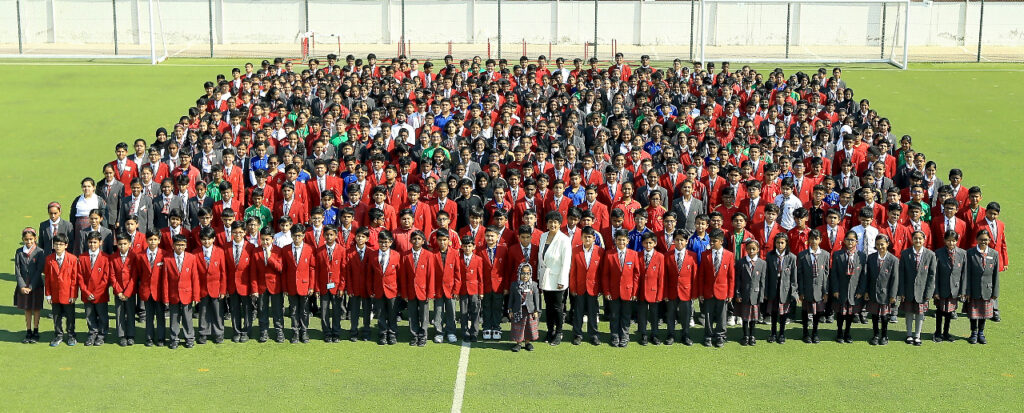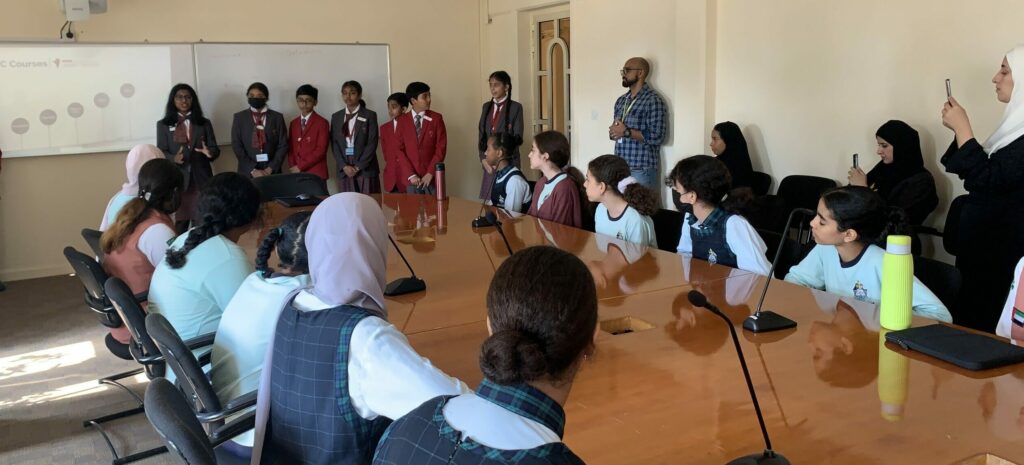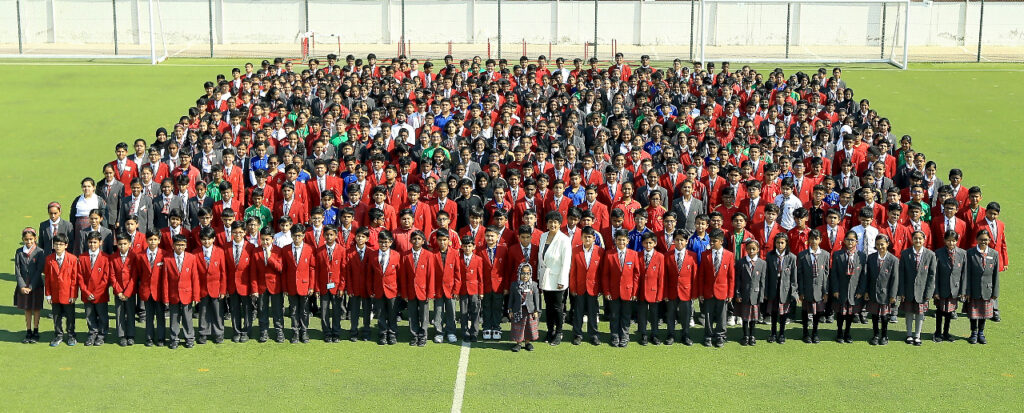A successful case
Imagine if all students at a school were well equipped to debate about and act on climate change?
At GEMS Legacy Academy, Dubai, UAE, that’s a reality. There, all 570 students have completed six courses on our e-learning platform. This school, led by Principal Ms. Asha Alexander, is taking the lead in mainstreaming climate change education across the school’s student body. Ms. Asha is a 2020 UN CC:Learn Champion and has been a climate change education advocate for several years now.

All 570 GEMS Legacy School students who completed 6 UN CC:Learn courses with Ms. Asha Alexander.
In addition to educating her pupils, she has other big plans: to bring UN CC:Learn courses to all 17,000 GEMS Education teachers and to partner with schools across the world, such as in Italy and Indonesia, to promote climate change education. For her, Education for Sustainable Development can play a key role in positively changing mindsets and behaviors.
We have interviewed Ms. Alexander about this noteworthy achievement by her school. You can read the full exchange with her below. Get inspired!
UN CC:Learn – In your opinion, what is the role of climate change education in addressing the climate crisis?
Asha Alexander – Climate change education plays a pivotal role in enlightening students to break damaging human and corporate cycles much earlier on in their lives. Visions like the Education for Sustainable Development (ESD) help diverse stakeholders of a school community understand and address the impacts of the climate crisis, empowering them with the knowledge, skills, values, and attitudes needed to act as agents of change. For our future generations to live more sustainably, we must implement climate change education, which will enable changes in patterns of consumption and production and encourage effective participation in policy-making to promote low-emission, climate-resilient societies, and sustainable development. Education is a crucial component of climate change mitigation and adaptation. It is a clarion call!
For our future generations to live more sustainably, we must implement climate change education, which will enable changes in patterns of consumption and production and encourage effective participation in policy-making to promote low-emission, climate-resilient societies, and sustainable development. – Ms. Asha Alexander – Principal – GEMS Legacy School
UN CC:Learn – Have you noticed any changes in your student’s behavior/actions after they started taking UN CC:Learn courses?
Asha Alexander – Yes, and the changes are evident in classrooms. Students are no more reliant on their teachers for guidance to initiate sustainability discussions or actions. And that is the direct outcome of creating a teaching environment that demonstrates sustainability in real-time. The UN CC:Learn courses have armed them with the knowledge, facts, and vocabulary to set up collaborative dialogue spaces as they exchange ideas, suggestions, and synergies in their work. This will eventually lay the groundwork for future partnerships with industries like SIEMENS and DULSCO to scale-up current initiatives and broader impact.
UN CC:Learn – In your opinion, which UN CC:Learn course is the most insightful for students?
Asha Alexander – The UN CC:Learn courses are a highly cost-effective way to address climate change, especially if combined with a lifetime learning approach. No one course is more advantageous than the other as each of them has a unique, insightful learning to offer. However, children were particularly interested in Sustainable Diet, Gender Equality and Human Rights and Children and Climate Change as they were able to relate to them more effectively. Each course provides a comprehensive overview of the scientific evidence for climate change, followed by region-specific insights on the impacts of a warmer world in the 21st century.
Each course provides a comprehensive overview of the scientific evidence for climate change, followed by region-specific insights on the impacts of a warmer world in the 21st century. – Ms. Asha Alexander – Principal – GEMS Legacy School
UN CC:Learn – If you could send a message on climate change education to other school principals around the world, what would you say?
Asha Alexander – Unleashing the knowledge and creativity of teachers and students to combat climate change is a golden opportunity for global leadership. We can spearhead a new green learning agenda – a coexisting way of educating and engaging children, youth, and adults in climate solutions to develop and implement climate action projects in homes, schools, and communities. This approach to teaching and learning is grounded in decades of research on how children learn and help build mastery of core academic content while also catalyzing climate action. It could be an alternate route to closing the learning gap in 21st-century workplace skills between low and high-income girls and boys, and strengthening teacher capacity.
The Students’ Side of the Story
And what do the GEMS Legacy students think about all this? Do they really feel more empowered to deal with climate change? We wanted to get their take on this whole experience.
Here’s what one of Principal Asha’s students told us.

GEMS Legacy School Students delivering a presentation about the UN CC:Learn courses they have taken.
UN CC:Learn – In your opinion, how can school students address the climate crisis?
GEMS Legacy Student – I think school students can address the climate crisis bearing in mind that ‘a little bit of kindness can go a long way’. We can learn to be kind and empathetic toward the environment and Mother Nature. Planting trees through Plant A Legacy (PAL), electricity conservation, waste segregation, recycling, composting, carpooling or using school transport, sharing or reusing resources, upcycling older books, uniforms, and school bags as well as participating in community conservation efforts are just some of the little yet effective ways in which we as students can address the climate crisis.
UN CC:Learn – Please tell us a few things you have learned from UN CC:Learn that helped you take climate change action.
GEMS Legacy Student – The UN CC:Learn courses have provided us with the direction and knowledge we need to act. It has successfully led us on a path to sustainable entrepreneurship as we make conscious lifestyle decisions. Students today are now more aware of the impact of their personal day-to-day actions. Now, when we plan and implement climate action strategies, we feel confident that our ideas are backed by the learning that we have received through the UN:CC courses.
The UN CC:Learn courses have provided us with the direction and knowledge we need to act. It has successfully led us on a path to sustainable entrepreneurship as we make conscious lifestyle decisions. – GEMS Legacy School Student
UN CC:Learn – If you could send a message on climate change action to other students around the world, what would you say?
GEMS Legacy Student – Make your voice heard by those in power, especially by policymakers. Follow through on all words with effective and impactful actions. Start local and strive for global climate justice. The focus must shift from the blame-game to collective, shared responsibility as climate change is an issue that requires coordinated solutions across all levels.

